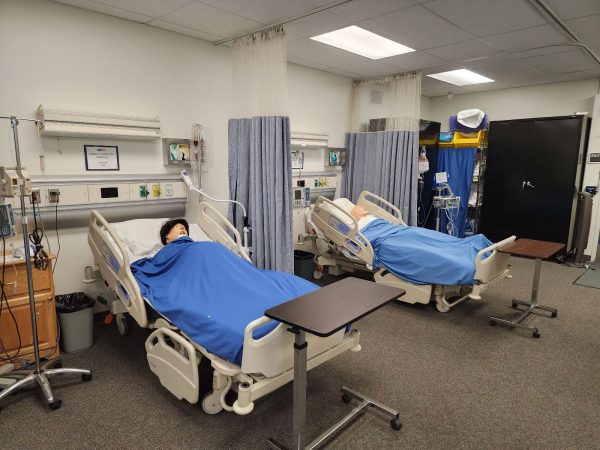
She sits at a desk with a sign that reads: Chaos Coordinator. It seems a juxtaposition to the calm, collected and confident woman sitting behind the desk.
Dr. Noemi Barajas will transition from the title of interim director to official director of the health sciences on Oct. 18 once the Board of Trustees votes her in. The interim title came to Barajas on Sept. 14.
For Barajas, it has been years in the making. Barajas remembered the first time she knew she had a calling toward the nursing profession. Her grandmother and father each suffered from diabetes and needed help with giving themselves injections. Unlike most, Barajas was intrigued by the task. She recalled she would find herself practicing injections.
Barajas came to the U.S. when she was 7 years old, she said.
Teaching and educating others came from positive experiences with educators throughout her primary and secondary education, Barajas said. The teachers she said she remembers most are Ms. Armstrong and Mr. Taylor, and many great nursing counselors.
From high school, Barajas received her licensed vocational nurse degree from Los Angeles Unified School District. Her bachelor’s degree came from California State University Dominguez Hills. To teach, she got her vocational teaching credential from the University of San Diego. Her next major educational milestone came when she got her master’s degree from Mount Saint Mary’s College. Her crowning achievement of becoming a doctor in nursing practice was obtained in 2019 from California State University Fullerton. These accomplishments bring Barajas an even greater sense of pride as she is a first-generation graduate.
An element that gave Barajas a unique advantage to her position is an extensive history of being a nurse. Barajas gained experience and knowledge while working in various clinics and hospitals. Her first job was at the King/Drew Medical Center. Her work there mainly focused on perinatal care. Barajas’ employer Emmanuel Health Care Center, a skilled nursing facility, was a place where she had a supervisory role providing her the experience of being in a position of power in regards to delegating duties and handling problems for the nursing staff.
A strong memory Barajas has of her time working as a nurse was an incident involving a woman who came into the emergency room pregnant and with what appeared to be bruises in her abdomen. The woman was not fluent in English, and Barajas helped translate for the medical team. Later it was discovered that the woman was bleeding internally. The cause of the bruising, which came out later, was a violent kick from her partner.
The woman, Barajas said, had children at home and was extremely scared and distraught over the safety of herself and her unborn baby. Barajas helped the woman as she was being prepared for an emergency cesarean section. Barajas’ shift was supposed to be coming to a close, but the woman’s fear at being alone during the surgery drove Barajas to stay past her shift. She held onto the mother’s hand all throughout surgery and the subsequent period while the mother was intubated and put into the intensive care unit.
Barajas said even though the mother spent three weeks in the intensive care unit, both she and her baby made it.
It’s the spirit that Barajas wishes to teach her students.
“You always put yourself in the patients’ shoes. How would you like to be taken care of?” said Barajas.
The one drawback Barajas said she has with her promotion is that she’ll spend less time in the classroom teaching and being with her students. She still wants the students to know that she has an open door and is willing to listen.
Some of the chaos that faces Barajas to coordinate in her new position is helping Citrus to fall in line with the accreditation board for the nursing program’s guidelines. The accreditation board wants to bring every nursing school with accreditation to a certain standardized program to make it easier for students to transfer between colleges and to make it easier for them to take classes at multiple schools if desired. To accomplish this, they want to rearrange the curriculum. Barajas said, for example, one of her tasks is to group three previously standalone classes: -pharmacology, gerontology, and leadership- and turn it into one class for students to take.
Other sweeping changes come to the next generation of nursing students when it comes to taking their National Council Licensure Exam for board certification. The test is going from a multiple choice to a system more focused on case study and analysis.
Barajas is already gearing up to ensure that the pass rate for students is great. She is working at getting Uworld, an online software that will help the students get prepared for the new method of testing. She is also coordinating with Kaplan, the publishing company, to help get supplemental help for both students and faculty.
Barajas’ family away from home in the department has been encouraging to her through this period of change and adjustment, Barajas said.
Dean Allahbachayo had left a system in place to help and support the transition, Barajas said. Her office is covered with treasured gifts she’s received from the students and faculty members. Barajas enjoys that Citrus’ smaller program has allowed the students and faculty to have a more personal and guided learning environment.
The pride Barajas has is evident when showing off the Skills Lab on campus, a place where nursing students can come to do hands-on practice on things such as wound care and intravenous insertion.
The Chaos Coordinator of Citrus’ health sciences is capable and certainly able to carry the department into the next generation of students.


